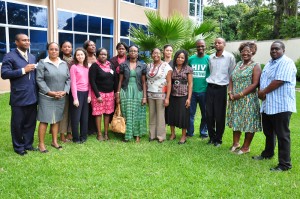Sub-Regional Experts Meeting on, Property Rights, Inheritance HIV & AIDS in Eastern & Southern Africa
Published on May 17, 2011 at 3:20 PM by FACE OF MALAWI
The interchange between statutory laws, customary laws, religious laws and other laws in Eastern and Southern Africa Countries plays a critical role in determining whether women can exercise their right to inherit and own property. The inability of a woman or her child to inherit and own property, which is mostly occasioned by harmful cultural practices, exposes these women and their children to risky life styles that increase their vulnerability to HIV. This has been demonstrated by the cultural structures project that KELIN is currently undertaking in Kisumu County in Kenya.

A group photo of the participants at the meeting
As a follow up to the Strategy Conference for Inheritance Legal Network for East and Southern Africa which was held in Nairobi Kenya 25th – 27th May, 2009, in which Commissioner Catherine Muyeka Mumma represented KELIN. The Women & Law in Southern Africa Research Trust in Partnership with FIDA- Kenya and with support from the Open Society Foundation(OSF), brought together 15 experts and human rights activities from Kenya, Lesotho, Namibia, Malawi, Uganda, Tanzania and Zimbabwe. The experts gathered to share their country experiences and to develop a collective strategy as relates to the future of the right of women to inherit and own property in ESA.
The meeting brought together seasoned lawyers working on women and property rights and respected academics. Amongst the participants were Seodi White, Executive Director Women & Law in Southern Africa Research Trust (WLSA- Malawi), Lydia Nabiryo, Board Member FIDA Uganda, Claris Ogangah, Deputy Executive Director FIDA-Kenya, Hilda Stewart, Head Publicity and Legal Literacy, Tanzanian Women’s Lawyers Association (TAWLA), Mamosa Nokana, WLSA- Lesotho, Tamar Ezra, Senior Programme Officer, OSF and Allan Achesa Maleche, Coordinator KELIN.
The meeting coincided and overlapped with the annual Grassroots women’s meeting called the Land Academy organized by Maasai Women Development Organization (MWEDO) in partnership with the Huairou Commission that took place in Arusha 3rd -6th of April . This would enable the experts to have interactions with grassroots women who are directly affected by the issues of property and inheritance.
The Legal Network for Women’s inheritance and Property Rights, which is the network body through with the aforementioned organisations operates to advocate for women’s property rights, used this opportunity to launch its website. It was agreed that each member organisation would contribute to the content on of the website on a monthly basis as means of sharing information and best practices as relates to women and property rights in the context of HIV. A list of some of the actual recommendations about how to strengthen collaboration and some of the issues relating to the right to inherit and own property will soon be posted in our resource centre and our partner’s organisation website of WIN and FIDA-Kenya.
Source : here